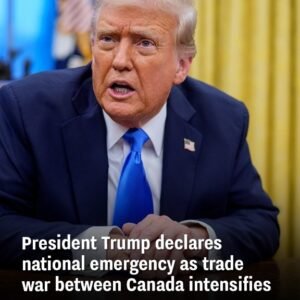Trump Declares National Emergency Amid Rising Trade Tensions with Canada
President Donald Trump has declared a national emergency in response to escalating trade tensions with Canada. The decision follows Ontario Premier Doug Ford’s announcement of a surcharge on electricity exports, which could significantly increase U.S. consumer utility bills. The move marks a new phase in the trade war between the two nations, which has already seen rising tariffs on steel, aluminum, and automobiles.
The conflict stems from earlier trade policies introduced by the Trump administration. Tariffs were initially imposed on Canadian goods under the pretext of national security, aiming to protect American industries. However, these measures triggered retaliation from Canada, leading to a cycle of escalating tariffs and countermeasures.
Premier Ford’s proposed electricity surcharge directly impacts states such as New York, Minnesota, and Michigan. This additional charge could add up to $100 per month to American utility bills, putting financial pressure on businesses and households. The policy is seen as a direct response to Trump’s tariffs on Canadian exports.
In retaliation, the Trump administration has announced plans to double tariffs on Canadian steel and aluminum. Additionally, new tariffs on automobiles are expected, further straining economic relations. Trump has positioned these measures as necessary to counteract what he calls unfair trade practices by Canada.
Declaring a national emergency gives Trump broad executive powers to respond quickly. The declaration specifically targets the electricity sector in affected U.S. states. Trump has justified the move by calling Canada’s actions an “abusive threat” to American consumers and businesses.
Legal experts note that using national emergency powers for trade disputes is unusual and controversial. Critics argue that the measure could set a dangerous precedent, expanding executive authority beyond traditional national security concerns. However, Trump insists that immediate action is necessary to protect American interests.
Trump’s rhetoric has been sharp, warning that Canada’s policies could lead to severe consequences. He has threatened additional tariffs that could cripple Canada’s auto industry. The administration’s strategy is to force Canada into negotiations by increasing economic pressure.
On the Canadian side, Premier Ford remains firm in defending the surcharge. He argues that the policy is a necessary bargaining tool in response to Trump’s aggressive trade actions. Ford has positioned Canada as unwilling to be intimidated by U.S. economic pressure.
The trade war has broader economic consequences for both nations. U.S. manufacturers relying on Canadian imports face higher costs, which could lead to job losses and reduced competitiveness. Similarly, Canadian businesses are struggling with declining demand from American buyers due to rising prices.
The dispute also highlights the strategic role of energy in trade conflicts. Electricity exports have become a key leverage point, with Canada using them as a tool to negotiate better trade terms. The U.S., in turn, is looking for ways to counteract these disruptions through alternative energy policies.
The escalating conflict has raised concerns among business leaders. Many fear prolonged economic instability, which could weaken both countries’ economies. Some analysts warn that continued tariff increases may have long-term consequences for trade relations and supply chains.
Public reaction has been mixed, with American consumers worried about rising costs. Some support Trump’s aggressive stance, believing it will lead to fairer trade deals. Others, however, see the escalating tariffs as harmful to businesses and ordinary citizens.
The situation has geopolitical implications beyond North America. Other nations are watching closely, as the dispute could influence global trade policies. If the U.S. continues using tariffs as a primary tool, it may encourage other countries to adopt similar protectionist measures.
As the crisis unfolds, both sides face pressure to reach a resolution. Trade experts suggest that continued escalation could severely damage long-standing economic ties between the U.S. and Canada. Diplomatic negotiations will be crucial in determining the future of bilateral trade.
The trade war between the U.S. and Canada underscores the complexities of global economic relations. Whether these aggressive policies will lead to better trade terms or long-term instability remains uncertain. The coming months will be critical in shaping the economic future of both nations.
